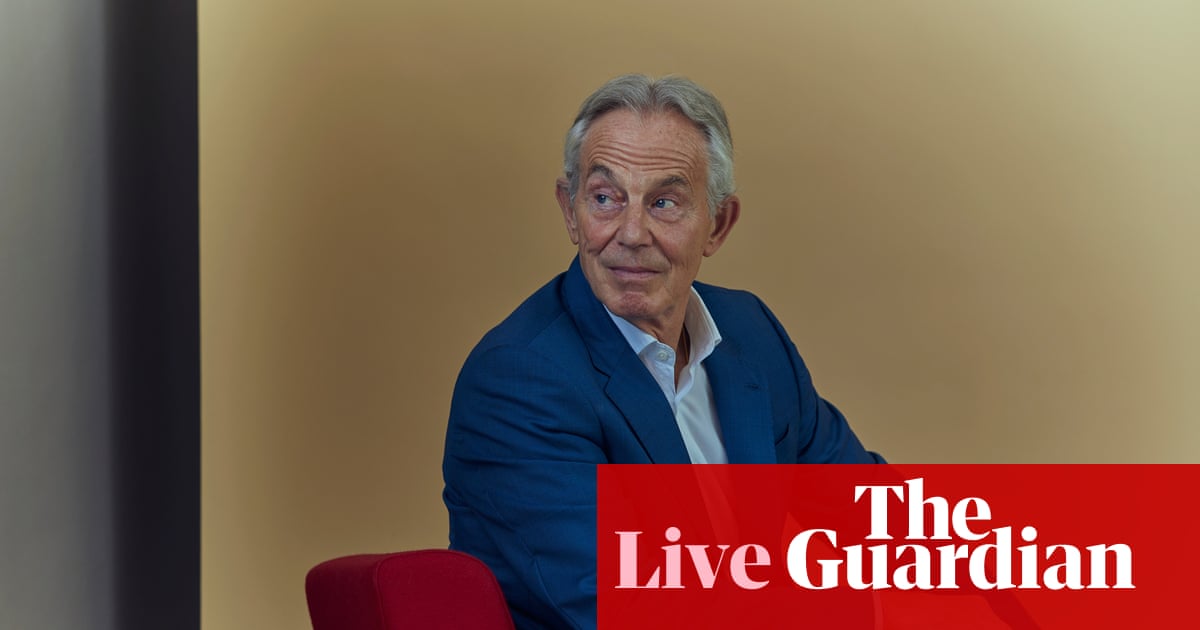Good morning. Keir Starmer faces PMQs a day after Tony Blair in effect fired a torpedo at his net zero strategy – an essential part of Labour’s Plan for Change. We covered the Blair commentson the blog yesterdayand here isJessica Elgot’s story.
Blair has been out of office for 15 years, but he is still an influential and knowledgeable figure and there is no one alive in British politics who has a better record at winning general elections. Until relatively recently, climate policy was an area on which all the main parties were broadly agreed. AfterKemi Badenochrecently gavea speechsaying that the government’s legal target of getting carbon emissions down to net zero by 2050 was unachievable (despite the fact the Tory government legislated for this, and Badenoch herself was one of the MPs whoapproved the secondary legislation without voting against), and withNigel Faragenow sayingthe government does not need to do anything about climate change, the Blair intervention is final proof that that consensus is now in tatters.
Badenoch is likely to raise this at PMQs today, not least because much ofwhat Blair saidsounded as if it could have come from one of her speeches. According toPolitico, Farage is also due to get a question today too.
Steve Reed,the environment secretary, was doing a morning interview round, and he played down the significance of Blair’s intervention. He told Times Radio:
Reed was followingEd Miliband, the energy secretary, who said this when asked about the Blair comments in the Commons yesterday.
But, privately, Labour figures are not as relaxed about Blair’s intervention as these comments imply. This is whatSam BlewettandNoah Keateare reporting in theirLondon Playbook briefing.
Here is the agenda for the day.
10am:John Swinney, Scotland’s first minister, speaks to the Scottish TUC conference in Dundee.
Morning:Adrian Ramsay, the Green party’s co-leader, is campaigning in Doncaster.
Noon:Keir Starmer facesKemi Badenochat PMQs.
2pm:Shabana Mahmood, the justice secretary, gives evidence to the joint committee on human rights.
2pm:David Lammy, the foreign secretary, gives evidence to the Lords international relations and defence committee.
Afternoon:Ed Davey, the Lib Dem leader, is campaigning in Tunbridge Wells in Kent.
Afternoon:Kemi Badenoch is campaigning in Hertfordshire. She is also due to do an interview with GB News.
Afternoon:Angela Rayner, the deputyLabourleader, is campaigning in south Yorkshire.
If you want to contact me, please post a message below the line when comments are open (normally between 10am and 3pm at the moment), or message me on social media. I can’t read all the messages BTL, but if you put “Andrew” in a message aimed at me, I am more likely to see it because I search for posts containing that word.
If you want to flag something up urgently, it is best to use social media. You can reach me on Bluesky at @andrewsparrowgdn.bsky.social. The Guardian hasgiven up posting from its official accounts on Xbut individual Guardian journalists are there, I still have my account, and if you message me there at @AndrewSparrow, I will see it and respond if necessary.
I find it very helpful when readers point out mistakes, even minor typos. No error is too small to correct. And I find your questions very interesting too. I can’t promise to reply to them all, but I will try to reply to as many as I can, either BTL or sometimes in the blog.
